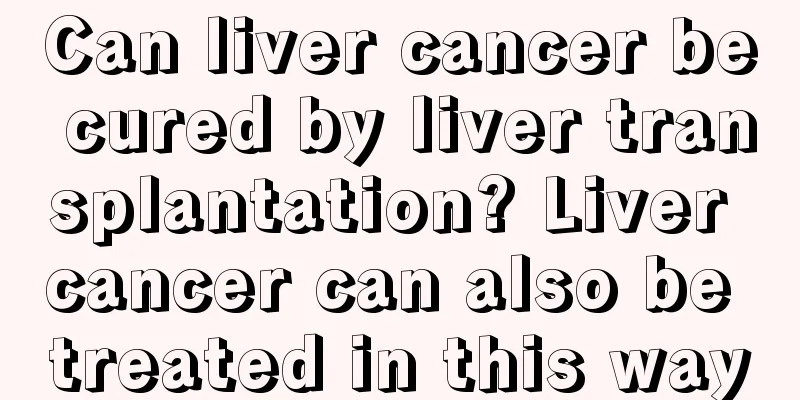Can liver cancer be cured by liver transplantation? Liver cancer can also be treated in this way

|
Liver transplantation is a very important means to cure liver cancer, but in fact the requirements for liver transplantation are very high, especially since liver resources are currently insufficient and the operation is difficult. It takes evaluation from all aspects to determine whether the liver transplantation meets the requirements and thus achieve the real effect of liver cancer treatment. Liver cancer can be treated by liver transplantation. Liver cancer is a common digestive system malignancy with a very high degree of malignancy. The average survival period of patients is relatively short and the prognosis is very poor. Liver cancer mostly comes from long-term chronic liver disease, such as hepatitis B and hepatitis C virus infection. The disease gradually progresses and develops into cirrhosis and liver cancer. In addition, aflatoxin contamination in the diet can also lead to the occurrence of liver cancer. Early diagnosis and early surgical treatment of liver cancer can significantly improve the prognosis and prolong the patient's survival. If the liver cancer is more serious and belongs to the middle and late stages of liver cancer, minimally invasive treatment can be considered, such as interventional embolization, microwave or other ablation treatments. When necessary, targeted drugs and traditional Chinese medicine can be considered. If conditions permit, matching can be done in advance, and liver transplantation can be considered when necessary. Generally speaking, if the liver tumor has not metastasized to distant sites, liver transplantation can still be considered. If distant metastasis occurs, liver transplantation is of little significance. So whether this primary liver cancer can be replaced with a liver: First, it depends on the patient's tumor and the degree of localization or spread. Second, it is related to the patient's own physical condition, and a comprehensive consideration of both is taken to decide whether to perform a liver transplant. First of all, we know that liver tumors are more common. For early liver cancer, the doctor's first choice is surgical treatment. There are also interventional treatments, microwave treatments, and radiofrequency treatments. The final application also includes molecular targeted drugs, such as sorafenib and other targeted drug treatments. Surgery is generally not used for advanced tumors. For liver transplants, what kind of patients are suitable for liver transplants depends on the patient's basic liver condition and liver function. For early liver cancer, liver transplants can be performed, which can achieve a cure, but after liver transplantation, there are also some side effects, such as some common rejection reactions and some infections. Therefore, not all people can achieve a radical cure after a transplant. First, they must pass the rejection period and infection period in order to achieve the purpose of cure. |
>>: What causes liver cancer? 4 reasons tell you how liver cancer is formed
Recommend
How to treat excessive masturbation?
Masturbation, which is what we call masturbation....
How long can a person live with liver metastasis of nasopharyngeal carcinoma? What are the treatments for nasopharyngeal carcinoma?
Liver metastasis of nasopharyngeal carcinoma is o...
Common knowledge about medication for pain in patients with lymphoma
Lymphoma patients in the late stage will suffer f...
Apply toothpaste on the soles of feet
Each of us has feet, which are actually very impo...
What are some dietary tips for Bartholin’s gland abscess?
Bartholin's gland abscess is a disease that o...
Is Changchun Oilseed Vine poisonous
Many people don’t know much about Changchun Oilse...
Has the itching caused by breast cancer metastasized?
Itching on the body does not mean that breast can...
Is nail polish harmful to babies?
There are a wide variety of colorful nail polishe...
The dangers of not sweating in summer
When the hot summer comes, everyone will sweat al...
What is the method of foot soaking? Teach you how to soak your feet correctly
Soaking your feet regularly can be said to be a r...
How to make facial contours more distinct
The contour of the face is critical to the overal...
Can childhood malignant osteosarcoma be cured?
The treatment effect of childhood malignant osteo...
What to do if tongue cancer recurs after surgery
After tongue cancer recurs, it can be relieved th...
How to treat eczema on fingers?
Eczema is a skin disease that is almost not picky...
How to diagnose schizophrenia?
As the name suggests, schizophrenia is a mental i...









